As a travel journalist and someone who cares deeply about the future of our planet, the moral dilemma of air travel is something I constantly grapple with. I’ve reduced the number of trips I take, buy carbon offsets when I travel and focus my assignments on stories that allow me to tackle conservation issues whenever possible. But the positive effect these measures have had is hard to quantify.
What isn’t as nebulous is this: when the world stays home, the planet benefits. There’s nothing good about the coronavirus, but with a ban on non-essential travel and some countries in lockdown, we’re able to witness what happens to the Earth when we’re largely absent for the first time.
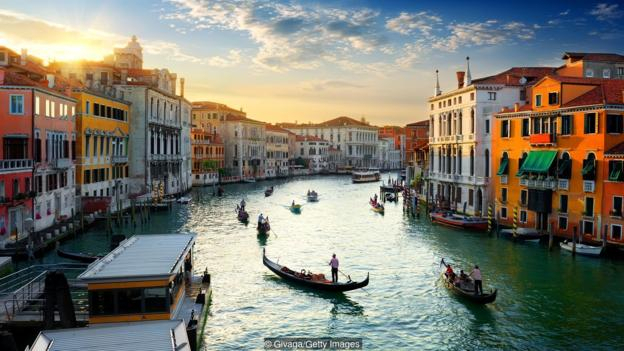
Waterways in Venice currently appear cleaner because of a drastic reduction in tourist boat traffic (Credit: Givaga/Getty Images)
Satellite images published by NASA and the European Space Agency detected a reduction in nitrogen dioxide emissions (which come predominantly from the burning of fossil fuels) from January to February in China, due to the economic slowdown during quarantine. Findings by the Centre for Research on Energy and Clean Air (CREA) show that China’s carbon dioxide emissions (which also come from fossil fuel combustion) have reduced by 25% because of measures taken to contain the coronavirus.
During Italy’s quarantine, similar satellite data has shown a drop in nitrogen dioxide emissions in the country’s northern region; and waterways in Venice appear cleaner because of a drastic reduction in tourist boat traffic (though, much to the chagrin of animal lovers, the photos circulating of dolphins frolicking in the canals were actually taken nearly 800km away in Sardinia).
In India, a nationwide curfew on 22 March resulted in the lowest average level of nitrogen dioxide pollution ever recorded in spring, according to the Centre for Research on Energy and Clean Air (CREA). And as North America (one of the world’s major polluters) enters a major economic downturn, it’s likely we’ll see similar effects there.
Of course, a global health crisis is not the answer to reducing greenhouse gas emissions, but the phenomenon should give us cause to reflect on the impact human activity has on the planet – including how we travel.
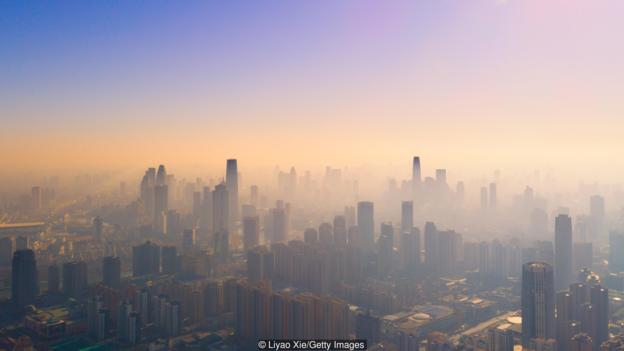
Polluted Chinese cities have seen a dramatic reduction in nitrogen dioxide levels over recent months (Credit: Liyao Xie/Getty Images)
Restrictions on non-essential travel means airlines are grounding planes, drastically slashing flights or suspending operations completely. While data on the specific environmental outcomes of reduced aviation is yet to be published, we know it’s likely to have a significant impact. A 2017 study conducted by researchers at the Lund University Centre for Sustainability Studies in Sweden (LUCSUS) in partnership with the University of British Columbia showed that there are three personal choices we can make to quickly cut a lot of greenhouse gas emissions: reduce air and car travel, as well as meat consumption.
A 2018 study published in Nature Climate Change showed that emissions from tourism add up to 8% of the global total, with flying making up the largest share of this. “By far, the biggest action we can take is to stop flying or to fly less,” said Kimberly Nicholas, a sustainability scientist at LUCSUS. “One round-trip flight from New York to London is the equivalent of about two years of eating meat [in terms of personal carbon footprint].”
In light of these startling statistics – in conjunction with the visible signs of environmental relief we’ve seen as the world stays home to beat Covid-19 – the question needs to be posed: when we can travel again, should we?
“There's just no way to have a safe climate and the business-as-usual plan with the aviation industry,” said Nicholas.
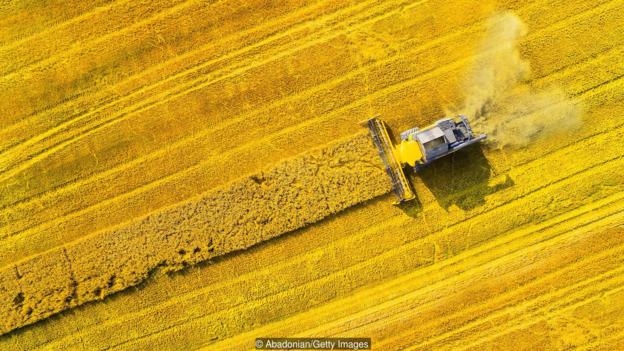
Biofuels offer a solution, but we may not have enough land to spare (Credit: Abadonian/Getty Images)
If we want to meet the Paris Agreement’s target of limiting global warming to 1.5°C above pre-industrial levels by 2030, we need to make significant changes to how we travel. Part of this is going to have to come from within the airline and transportation industries.
Some airlines are making headway through research into innovations like biofuel and electric-powered aircraft. “There's still a lot of potential fuel economy that could be gained from redesigning aircraft to be more efficient,” said Colin Murphy, deputy director of The Policy Institute for Energy, Environment and the Economy at University of California, Davis. “If you're using waste oil, biofuels typically get about 60% greenhouse gas reductions compared to conventional petroleum,” he added. The amount of land needed to grow new sources of biofuel – renewable fuel derived from organic materials – could pose a problem, however. And while there’s potential for electric-powered aircraft, Murphy notes that limited battery technology means this will never be a viable solution for long-haul flights.
Overtourism is just another form of overconsumption
Even if we succeed with these technological innovations, we still need to change our approach to travel as individuals. Just as the planet seems to be taking a breath right now, we’ve also been offered an opportunity for introspection. The coronavirus pandemic has forced us to see how interconnected the people, systems and organisations in our world are. While this revelation has been devastating in terms of how quickly the virus has spread globally, it’s also shown us how we’re able to unite and act as individuals for the collective good. We’ve practised social distancing to protect the elderly and immune-compromised; we’ve cheered healthcare workers on from our balconies; and shared the message to #stayhome on social media.
When Covid-19 is behind us, we need to once again look outside ourselves and take individual action for the good of the planet. Just as coronavirus has forced our lives to slow down, we should consider a slower, more thoughtful approach to travel. There’s an authentic connection that comes with a place when we take the time to understand its people, culture and natural beauty in a meaningful way. This can’t be achieved with superficial port-to-port itineraries – we could also do without the environmental wreckage that a lot of large cruise ships leave in their wake – or by hopping around to a legion of countries in two weeks. It might mean taking one longer trip per year instead of packing in five or six shorter ones, which would drastically reduce our carbon footprint.
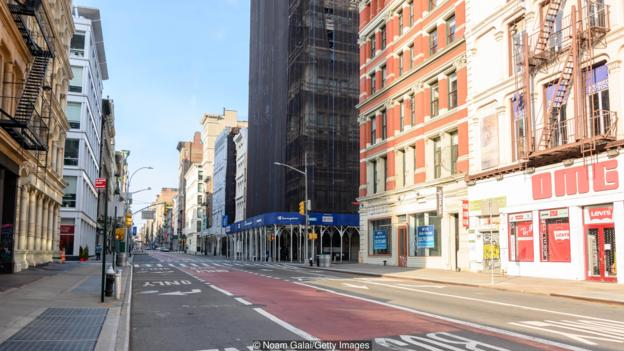
City streets around the world are deserted as countries try to stop the spread of the coronavirus (Credit: Noam Galai/Getty Images)
“Overtourism is just another form of overconsumption,” said Shannon Stowell, CEO of the Adventure Travel Trade Association and sustainable travel advocate. “I'm fine seeing tourism numbers lower overall and for the quality of tourism to increase, where people understand the destination better and have a positive impact on it versus overcrowding and pollution and wildlife habitat loss – which are all outcomes of too much tourism,” he added.
Carbon offsets help and they absolutely move the needle
We can also alleviate some of the environmental stress of travel simply by keeping more of our adventures local. “This is actually the biggest impact we can have,” said Nicholas. “I used to be a frequent flyer, but I’ve found other ways to find that kind of novelty and adventure. Basically, slow travel and self-powered travel.” This might look like enjoying your local beach instead of one in Mexico and saving your carbon budget for a more impactful trip.
When we do fly, we can purchase carbon offsets. “Carbon offsets help and they absolutely move the needle,” said Murphy. They're not as good as actually reducing the emissions from travel so you're not completely undoing all the harm, but they help.” When trying to decide what kind of offset to purchase, it’s vital to donate to a project that’s additional, meaning that it didn’t exist beforehand. So, when you donate to a cause that’s protecting deforestation, make sure the land in question wasn’t going to be protected anyway.
How we fly also matters. As enticing as the extra legroom in business class is, purchasing those seats also increases your carbon footprint because it means less passengers per plane. “The more densely packed you are, the lower your emissions are per passenger mile by quite a bit,” Murphy notes. “At a policy level, we need transparency about the true environmental impact of our choices, and we need prices to align with those impacts,” said Austin Brown, executive director of the Policy Institute at UC Davis. “For example, making first-class tickets cost more.” (The price tag on first-class seats is used to subsidise cheap economy tickets, reducing the overall cost of travel and allowing more people to fly.)
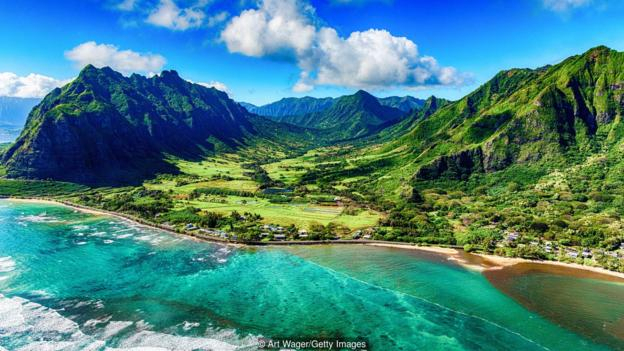
Exploring the world gives us the global perspective we need to care about the future of our planet (Credit: Art Wager/Getty Images)
When we’re on the ground in a destination, we can reduce our footprint by being respectful to the area’s culture and environment. “When you travel to a new place, you’re a guest in their home,” said Stowell. Part of accomplishing this is to choose sustainable accommodation and activities, and a green mode of transportation to explore the place you’re in. This might mean partnering with a sustainable local tour operator who is more familiar with the tourism landscape, which is also a way to give back to the local economy.
There are destinations, worldwide, reliant on travel and tourism for survival
To weed through eco-tourism greenwashing, travellers should be looking for tour operators with a transparent sustainability plan. “If you go on a company website and find a sustainable tourism plan, and you then see an impact report in the next 12 to 48 months, you know they’re putting their money where their mouth is,” said Shannon Guihan, sustainability officer at TreadRight, a sustainable tourism non-profit that has developed a checklist to help travellers adopt eco-friendly habits and be more conscious with their choices.
“We still need travel,” Guihan added. “Tourism is one of the biggest employers in the world and there are destinations, worldwide, reliant on travel and tourism for survival.”
Outside of the global tourism economy, travel has the potential to benefit all of us. When we travel in a meaningful way, we gain cross-cultural understanding and develop greater empathy for people outside of our immediate circle. Travel gives us the global perspective we need to care about the future of our home here on Earth.
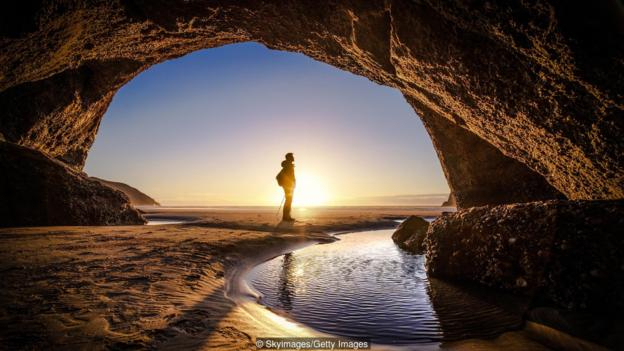
Slow and self-powered travel are good ways to reduce environmental stress (Credit: Skyimages/Getty Images)
Throughout my career as a journalist, I’ve shared mint tea with Bedouins in the middle of the desert in Jordan, looked into the eyes of a mountain gorilla in the lush jungles of Rwanda and tracked tigers under a white-hot sun with local naturalists in India. These experiences have given me a deep appreciation for the vast, diverse, infinitely beautiful world we live in, and a desire to protect it.
Our ability to wander has been temporarily taken from us, and never has it felt like more of a luxury. “This crisis might give us the opportunity to instill a new travel mindset,” said Stowell. “Travel is a privilege, not a right.”
I can’t imagine a world without travel, but I know that if we don’t change how we travel, there won’t be a planet left for us to explore.
Read the original article on BBC TRAVEL.















































